Analysis of International Business Operations: Tesco's Strategy
VerifiedAdded on 2021/02/19
|8
|1817
|322
Report
AI Summary
This report provides a detailed analysis of Tesco's international business operations. It begins with an introduction to international business and the environment in which Tesco operates, including political, economic, social, cultural, and technological factors. The report then examines the mechanisms that regulate international trade, such as trade blocs, free trade, quotas, and embargoes. It further explores how the environment and culture of different countries affect international business operations, providing examples of political and taxation differences. The report also discusses the effects of the financial environment on businesses operating internationally, highlighting the importance of financial markets and instruments. Finally, the report analyzes the reasons why businesses operate internationally, including market expansion, diversification, access to talent, competitive advantages, and foreign investment opportunities, along with the various strategies employed by businesses for international expansion, such as international, multi-domestic, and global strategies. The report concludes with a summary of the key findings and references relevant academic sources.
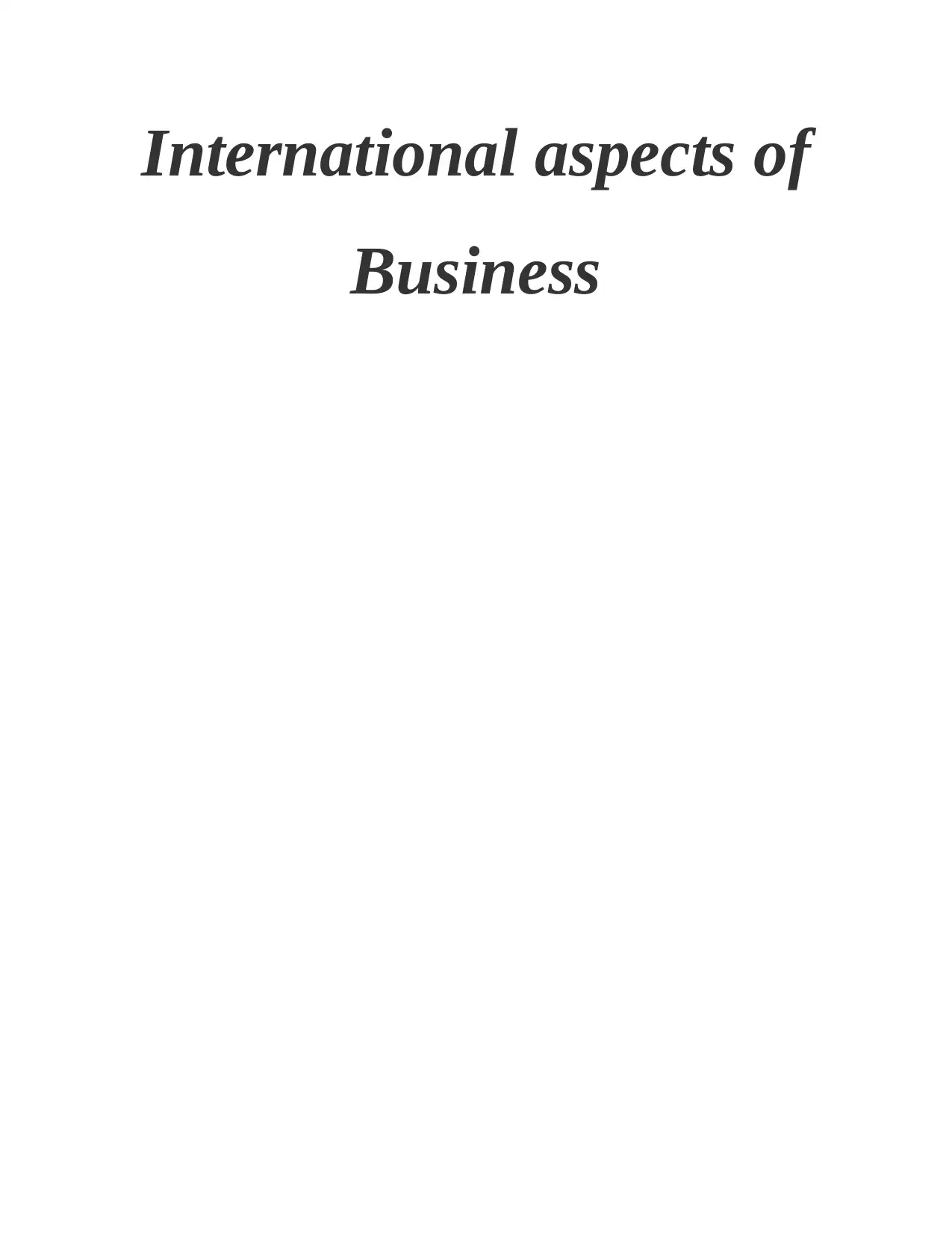
International aspects of
Business
Business
Paraphrase This Document
Need a fresh take? Get an instant paraphrase of this document with our AI Paraphraser
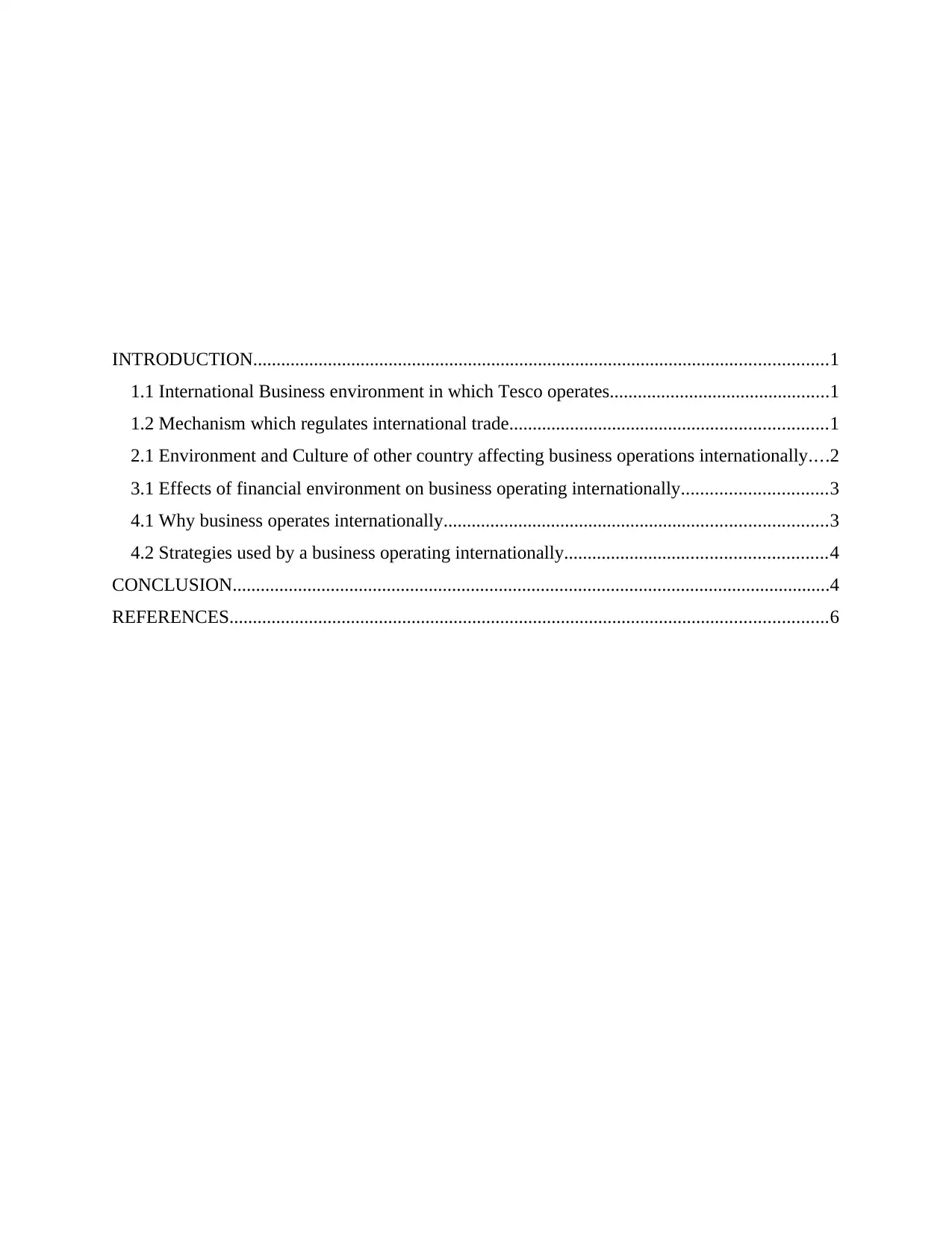
INTRODUCTION...........................................................................................................................1
1.1 International Business environment in which Tesco operates...............................................1
1.2 Mechanism which regulates international trade....................................................................1
2.1 Environment and Culture of other country affecting business operations internationally....2
3.1 Effects of financial environment on business operating internationally...............................3
4.1 Why business operates internationally..................................................................................3
4.2 Strategies used by a business operating internationally........................................................4
CONCLUSION................................................................................................................................4
REFERENCES................................................................................................................................6
1.1 International Business environment in which Tesco operates...............................................1
1.2 Mechanism which regulates international trade....................................................................1
2.1 Environment and Culture of other country affecting business operations internationally....2
3.1 Effects of financial environment on business operating internationally...............................3
4.1 Why business operates internationally..................................................................................3
4.2 Strategies used by a business operating internationally........................................................4
CONCLUSION................................................................................................................................4
REFERENCES................................................................................................................................6
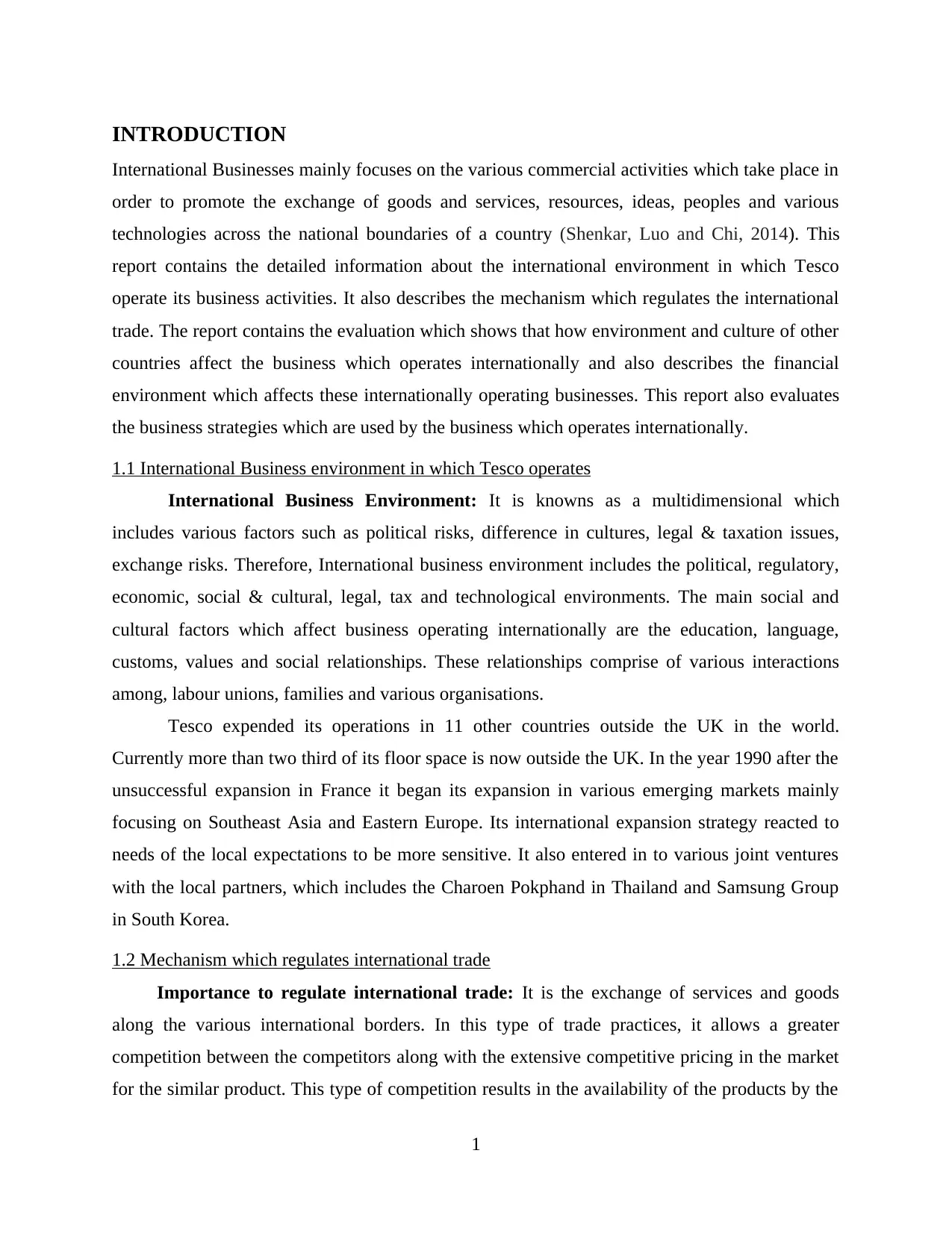
INTRODUCTION
International Businesses mainly focuses on the various commercial activities which take place in
order to promote the exchange of goods and services, resources, ideas, peoples and various
technologies across the national boundaries of a country (Shenkar, Luo and Chi, 2014). This
report contains the detailed information about the international environment in which Tesco
operate its business activities. It also describes the mechanism which regulates the international
trade. The report contains the evaluation which shows that how environment and culture of other
countries affect the business which operates internationally and also describes the financial
environment which affects these internationally operating businesses. This report also evaluates
the business strategies which are used by the business which operates internationally.
1.1 International Business environment in which Tesco operates
International Business Environment: It is knowns as a multidimensional which
includes various factors such as political risks, difference in cultures, legal & taxation issues,
exchange risks. Therefore, International business environment includes the political, regulatory,
economic, social & cultural, legal, tax and technological environments. The main social and
cultural factors which affect business operating internationally are the education, language,
customs, values and social relationships. These relationships comprise of various interactions
among, labour unions, families and various organisations.
Tesco expended its operations in 11 other countries outside the UK in the world.
Currently more than two third of its floor space is now outside the UK. In the year 1990 after the
unsuccessful expansion in France it began its expansion in various emerging markets mainly
focusing on Southeast Asia and Eastern Europe. Its international expansion strategy reacted to
needs of the local expectations to be more sensitive. It also entered in to various joint ventures
with the local partners, which includes the Charoen Pokphand in Thailand and Samsung Group
in South Korea.
1.2 Mechanism which regulates international trade
Importance to regulate international trade: It is the exchange of services and goods
along the various international borders. In this type of trade practices, it allows a greater
competition between the competitors along with the extensive competitive pricing in the market
for the similar product. This type of competition results in the availability of the products by the
1
International Businesses mainly focuses on the various commercial activities which take place in
order to promote the exchange of goods and services, resources, ideas, peoples and various
technologies across the national boundaries of a country (Shenkar, Luo and Chi, 2014). This
report contains the detailed information about the international environment in which Tesco
operate its business activities. It also describes the mechanism which regulates the international
trade. The report contains the evaluation which shows that how environment and culture of other
countries affect the business which operates internationally and also describes the financial
environment which affects these internationally operating businesses. This report also evaluates
the business strategies which are used by the business which operates internationally.
1.1 International Business environment in which Tesco operates
International Business Environment: It is knowns as a multidimensional which
includes various factors such as political risks, difference in cultures, legal & taxation issues,
exchange risks. Therefore, International business environment includes the political, regulatory,
economic, social & cultural, legal, tax and technological environments. The main social and
cultural factors which affect business operating internationally are the education, language,
customs, values and social relationships. These relationships comprise of various interactions
among, labour unions, families and various organisations.
Tesco expended its operations in 11 other countries outside the UK in the world.
Currently more than two third of its floor space is now outside the UK. In the year 1990 after the
unsuccessful expansion in France it began its expansion in various emerging markets mainly
focusing on Southeast Asia and Eastern Europe. Its international expansion strategy reacted to
needs of the local expectations to be more sensitive. It also entered in to various joint ventures
with the local partners, which includes the Charoen Pokphand in Thailand and Samsung Group
in South Korea.
1.2 Mechanism which regulates international trade
Importance to regulate international trade: It is the exchange of services and goods
along the various international borders. In this type of trade practices, it allows a greater
competition between the competitors along with the extensive competitive pricing in the market
for the similar product. This type of competition results in the availability of the products by the
1
⊘ This is a preview!⊘
Do you want full access?
Subscribe today to unlock all pages.

Trusted by 1+ million students worldwide
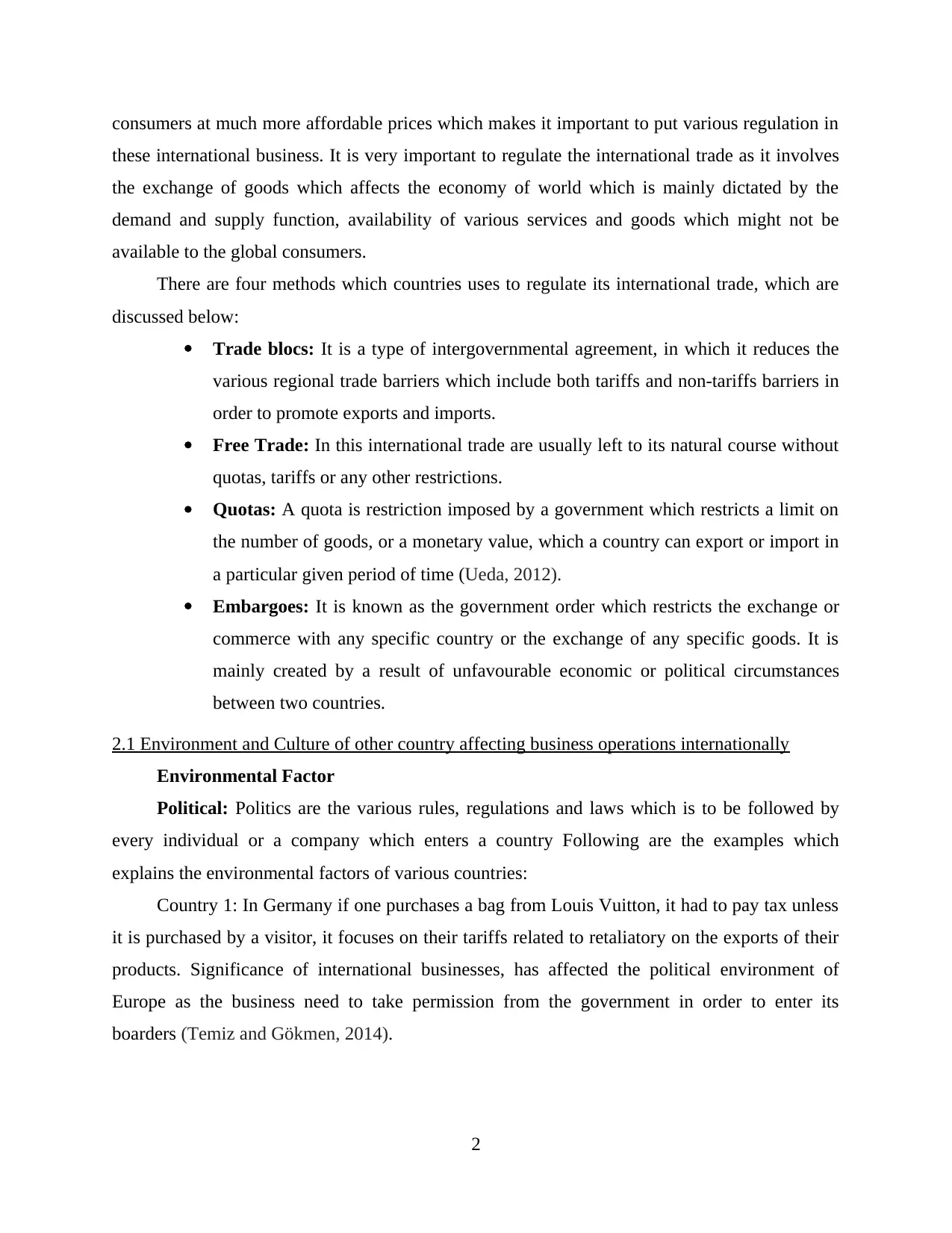
consumers at much more affordable prices which makes it important to put various regulation in
these international business. It is very important to regulate the international trade as it involves
the exchange of goods which affects the economy of world which is mainly dictated by the
demand and supply function, availability of various services and goods which might not be
available to the global consumers.
There are four methods which countries uses to regulate its international trade, which are
discussed below:
Trade blocs: It is a type of intergovernmental agreement, in which it reduces the
various regional trade barriers which include both tariffs and non-tariffs barriers in
order to promote exports and imports.
Free Trade: In this international trade are usually left to its natural course without
quotas, tariffs or any other restrictions.
Quotas: A quota is restriction imposed by a government which restricts a limit on
the number of goods, or a monetary value, which a country can export or import in
a particular given period of time (Ueda, 2012).
Embargoes: It is known as the government order which restricts the exchange or
commerce with any specific country or the exchange of any specific goods. It is
mainly created by a result of unfavourable economic or political circumstances
between two countries.
2.1 Environment and Culture of other country affecting business operations internationally
Environmental Factor
Political: Politics are the various rules, regulations and laws which is to be followed by
every individual or a company which enters a country Following are the examples which
explains the environmental factors of various countries:
Country 1: In Germany if one purchases a bag from Louis Vuitton, it had to pay tax unless
it is purchased by a visitor, it focuses on their tariffs related to retaliatory on the exports of their
products. Significance of international businesses, has affected the political environment of
Europe as the business need to take permission from the government in order to enter its
boarders (Temiz and Gökmen, 2014).
2
these international business. It is very important to regulate the international trade as it involves
the exchange of goods which affects the economy of world which is mainly dictated by the
demand and supply function, availability of various services and goods which might not be
available to the global consumers.
There are four methods which countries uses to regulate its international trade, which are
discussed below:
Trade blocs: It is a type of intergovernmental agreement, in which it reduces the
various regional trade barriers which include both tariffs and non-tariffs barriers in
order to promote exports and imports.
Free Trade: In this international trade are usually left to its natural course without
quotas, tariffs or any other restrictions.
Quotas: A quota is restriction imposed by a government which restricts a limit on
the number of goods, or a monetary value, which a country can export or import in
a particular given period of time (Ueda, 2012).
Embargoes: It is known as the government order which restricts the exchange or
commerce with any specific country or the exchange of any specific goods. It is
mainly created by a result of unfavourable economic or political circumstances
between two countries.
2.1 Environment and Culture of other country affecting business operations internationally
Environmental Factor
Political: Politics are the various rules, regulations and laws which is to be followed by
every individual or a company which enters a country Following are the examples which
explains the environmental factors of various countries:
Country 1: In Germany if one purchases a bag from Louis Vuitton, it had to pay tax unless
it is purchased by a visitor, it focuses on their tariffs related to retaliatory on the exports of their
products. Significance of international businesses, has affected the political environment of
Europe as the business need to take permission from the government in order to enter its
boarders (Temiz and Gökmen, 2014).
2
Paraphrase This Document
Need a fresh take? Get an instant paraphrase of this document with our AI Paraphraser
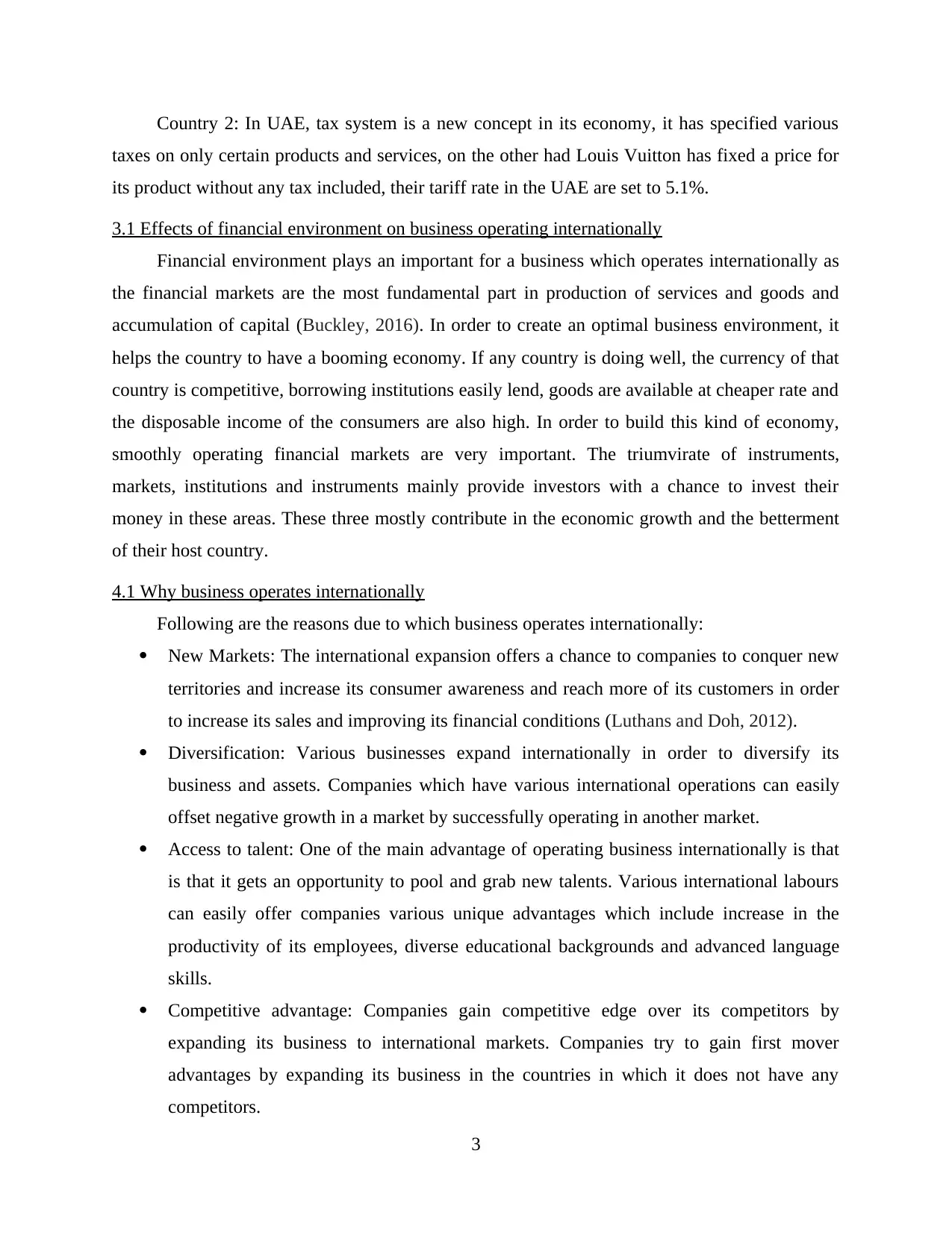
Country 2: In UAE, tax system is a new concept in its economy, it has specified various
taxes on only certain products and services, on the other had Louis Vuitton has fixed a price for
its product without any tax included, their tariff rate in the UAE are set to 5.1%.
3.1 Effects of financial environment on business operating internationally
Financial environment plays an important for a business which operates internationally as
the financial markets are the most fundamental part in production of services and goods and
accumulation of capital (Buckley, 2016). In order to create an optimal business environment, it
helps the country to have a booming economy. If any country is doing well, the currency of that
country is competitive, borrowing institutions easily lend, goods are available at cheaper rate and
the disposable income of the consumers are also high. In order to build this kind of economy,
smoothly operating financial markets are very important. The triumvirate of instruments,
markets, institutions and instruments mainly provide investors with a chance to invest their
money in these areas. These three mostly contribute in the economic growth and the betterment
of their host country.
4.1 Why business operates internationally
Following are the reasons due to which business operates internationally:
New Markets: The international expansion offers a chance to companies to conquer new
territories and increase its consumer awareness and reach more of its customers in order
to increase its sales and improving its financial conditions (Luthans and Doh, 2012).
Diversification: Various businesses expand internationally in order to diversify its
business and assets. Companies which have various international operations can easily
offset negative growth in a market by successfully operating in another market.
Access to talent: One of the main advantage of operating business internationally is that
is that it gets an opportunity to pool and grab new talents. Various international labours
can easily offer companies various unique advantages which include increase in the
productivity of its employees, diverse educational backgrounds and advanced language
skills.
Competitive advantage: Companies gain competitive edge over its competitors by
expanding its business to international markets. Companies try to gain first mover
advantages by expanding its business in the countries in which it does not have any
competitors.
3
taxes on only certain products and services, on the other had Louis Vuitton has fixed a price for
its product without any tax included, their tariff rate in the UAE are set to 5.1%.
3.1 Effects of financial environment on business operating internationally
Financial environment plays an important for a business which operates internationally as
the financial markets are the most fundamental part in production of services and goods and
accumulation of capital (Buckley, 2016). In order to create an optimal business environment, it
helps the country to have a booming economy. If any country is doing well, the currency of that
country is competitive, borrowing institutions easily lend, goods are available at cheaper rate and
the disposable income of the consumers are also high. In order to build this kind of economy,
smoothly operating financial markets are very important. The triumvirate of instruments,
markets, institutions and instruments mainly provide investors with a chance to invest their
money in these areas. These three mostly contribute in the economic growth and the betterment
of their host country.
4.1 Why business operates internationally
Following are the reasons due to which business operates internationally:
New Markets: The international expansion offers a chance to companies to conquer new
territories and increase its consumer awareness and reach more of its customers in order
to increase its sales and improving its financial conditions (Luthans and Doh, 2012).
Diversification: Various businesses expand internationally in order to diversify its
business and assets. Companies which have various international operations can easily
offset negative growth in a market by successfully operating in another market.
Access to talent: One of the main advantage of operating business internationally is that
is that it gets an opportunity to pool and grab new talents. Various international labours
can easily offer companies various unique advantages which include increase in the
productivity of its employees, diverse educational backgrounds and advanced language
skills.
Competitive advantage: Companies gain competitive edge over its competitors by
expanding its business to international markets. Companies try to gain first mover
advantages by expanding its business in the countries in which it does not have any
competitors.
3
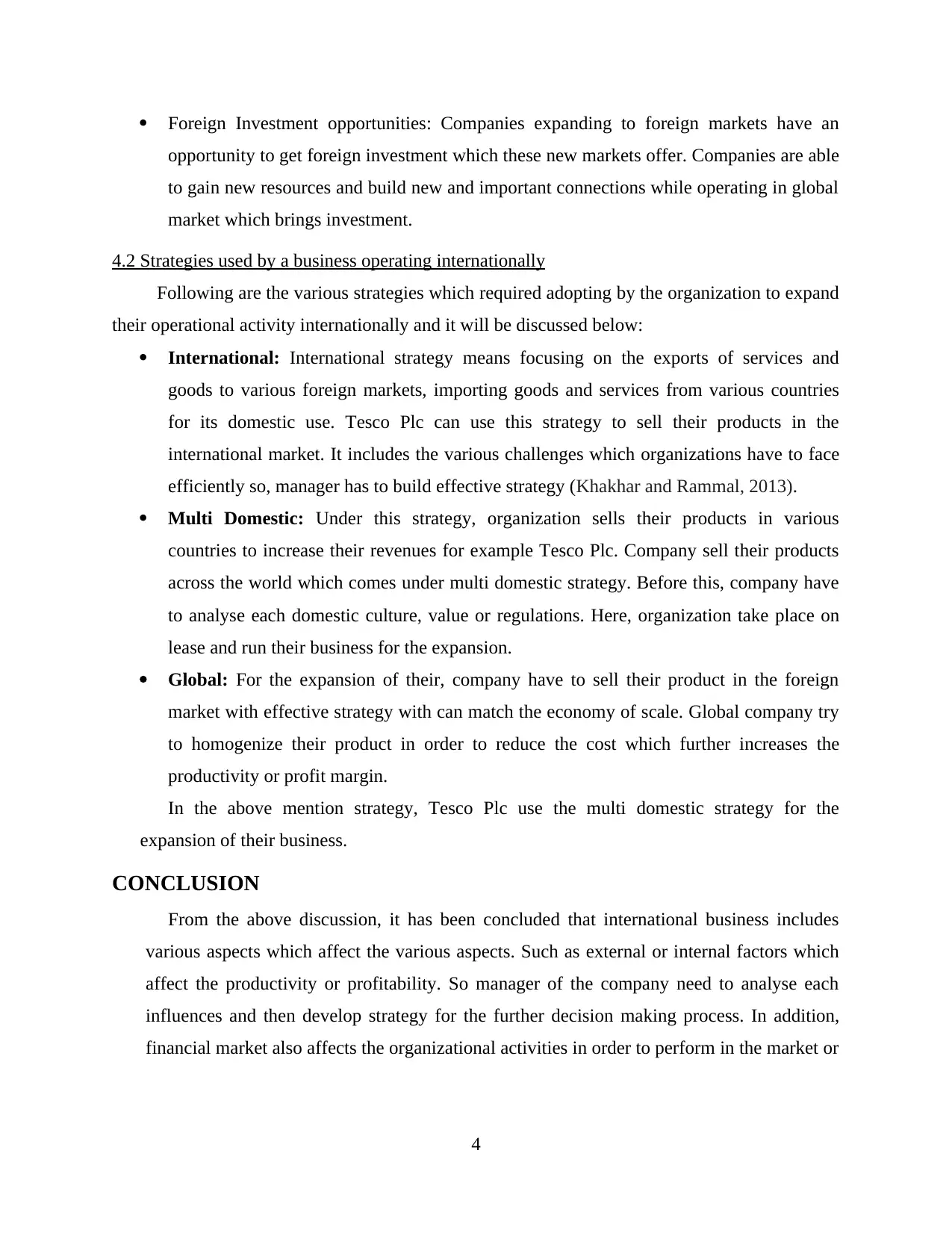
Foreign Investment opportunities: Companies expanding to foreign markets have an
opportunity to get foreign investment which these new markets offer. Companies are able
to gain new resources and build new and important connections while operating in global
market which brings investment.
4.2 Strategies used by a business operating internationally
Following are the various strategies which required adopting by the organization to expand
their operational activity internationally and it will be discussed below:
International: International strategy means focusing on the exports of services and
goods to various foreign markets, importing goods and services from various countries
for its domestic use. Tesco Plc can use this strategy to sell their products in the
international market. It includes the various challenges which organizations have to face
efficiently so, manager has to build effective strategy (Khakhar and Rammal, 2013).
Multi Domestic: Under this strategy, organization sells their products in various
countries to increase their revenues for example Tesco Plc. Company sell their products
across the world which comes under multi domestic strategy. Before this, company have
to analyse each domestic culture, value or regulations. Here, organization take place on
lease and run their business for the expansion.
Global: For the expansion of their, company have to sell their product in the foreign
market with effective strategy with can match the economy of scale. Global company try
to homogenize their product in order to reduce the cost which further increases the
productivity or profit margin.
In the above mention strategy, Tesco Plc use the multi domestic strategy for the
expansion of their business.
CONCLUSION
From the above discussion, it has been concluded that international business includes
various aspects which affect the various aspects. Such as external or internal factors which
affect the productivity or profitability. So manager of the company need to analyse each
influences and then develop strategy for the further decision making process. In addition,
financial market also affects the organizational activities in order to perform in the market or
4
opportunity to get foreign investment which these new markets offer. Companies are able
to gain new resources and build new and important connections while operating in global
market which brings investment.
4.2 Strategies used by a business operating internationally
Following are the various strategies which required adopting by the organization to expand
their operational activity internationally and it will be discussed below:
International: International strategy means focusing on the exports of services and
goods to various foreign markets, importing goods and services from various countries
for its domestic use. Tesco Plc can use this strategy to sell their products in the
international market. It includes the various challenges which organizations have to face
efficiently so, manager has to build effective strategy (Khakhar and Rammal, 2013).
Multi Domestic: Under this strategy, organization sells their products in various
countries to increase their revenues for example Tesco Plc. Company sell their products
across the world which comes under multi domestic strategy. Before this, company have
to analyse each domestic culture, value or regulations. Here, organization take place on
lease and run their business for the expansion.
Global: For the expansion of their, company have to sell their product in the foreign
market with effective strategy with can match the economy of scale. Global company try
to homogenize their product in order to reduce the cost which further increases the
productivity or profit margin.
In the above mention strategy, Tesco Plc use the multi domestic strategy for the
expansion of their business.
CONCLUSION
From the above discussion, it has been concluded that international business includes
various aspects which affect the various aspects. Such as external or internal factors which
affect the productivity or profitability. So manager of the company need to analyse each
influences and then develop strategy for the further decision making process. In addition,
financial market also affects the organizational activities in order to perform in the market or
4
⊘ This is a preview!⊘
Do you want full access?
Subscribe today to unlock all pages.

Trusted by 1+ million students worldwide
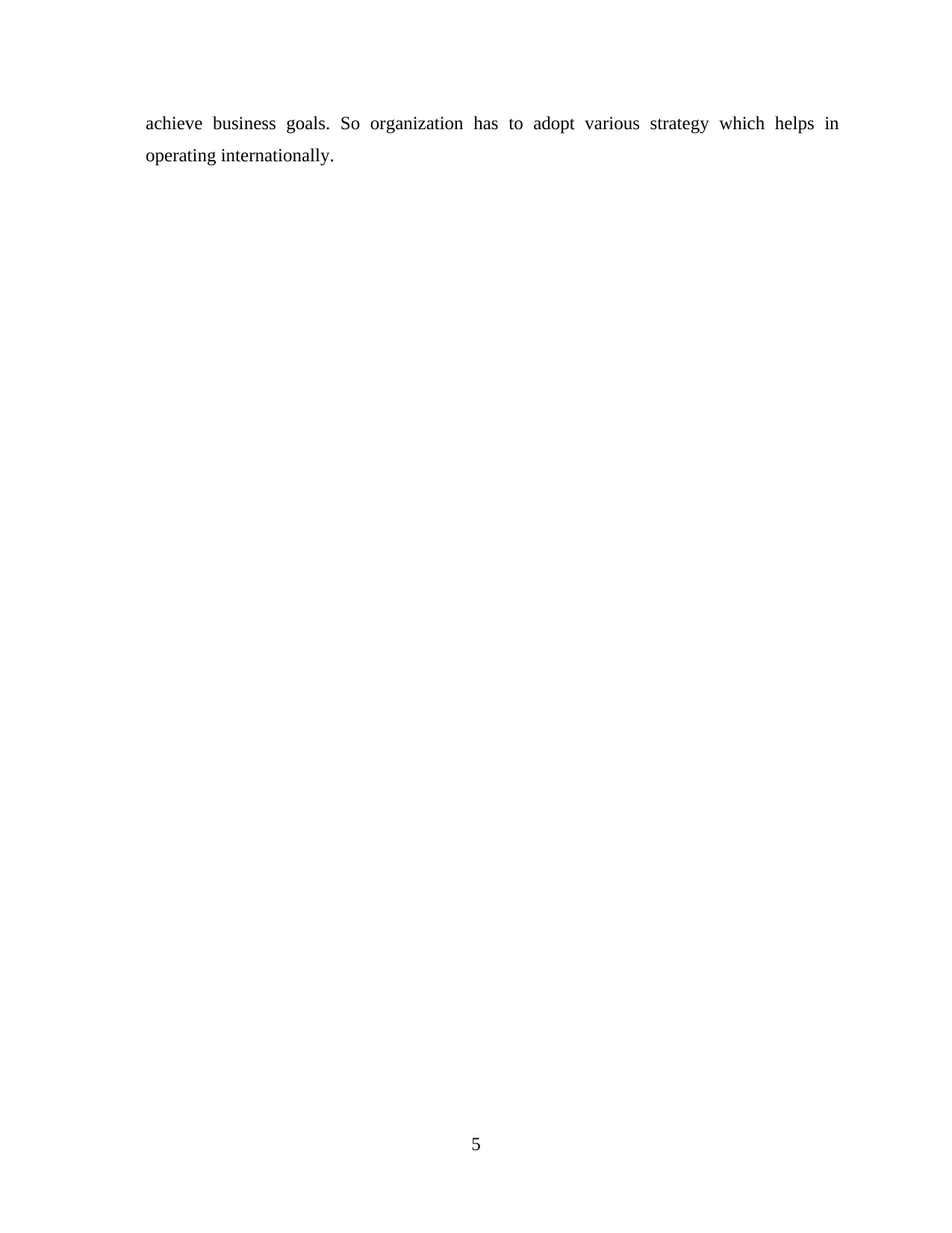
achieve business goals. So organization has to adopt various strategy which helps in
operating internationally.
5
operating internationally.
5
Paraphrase This Document
Need a fresh take? Get an instant paraphrase of this document with our AI Paraphraser
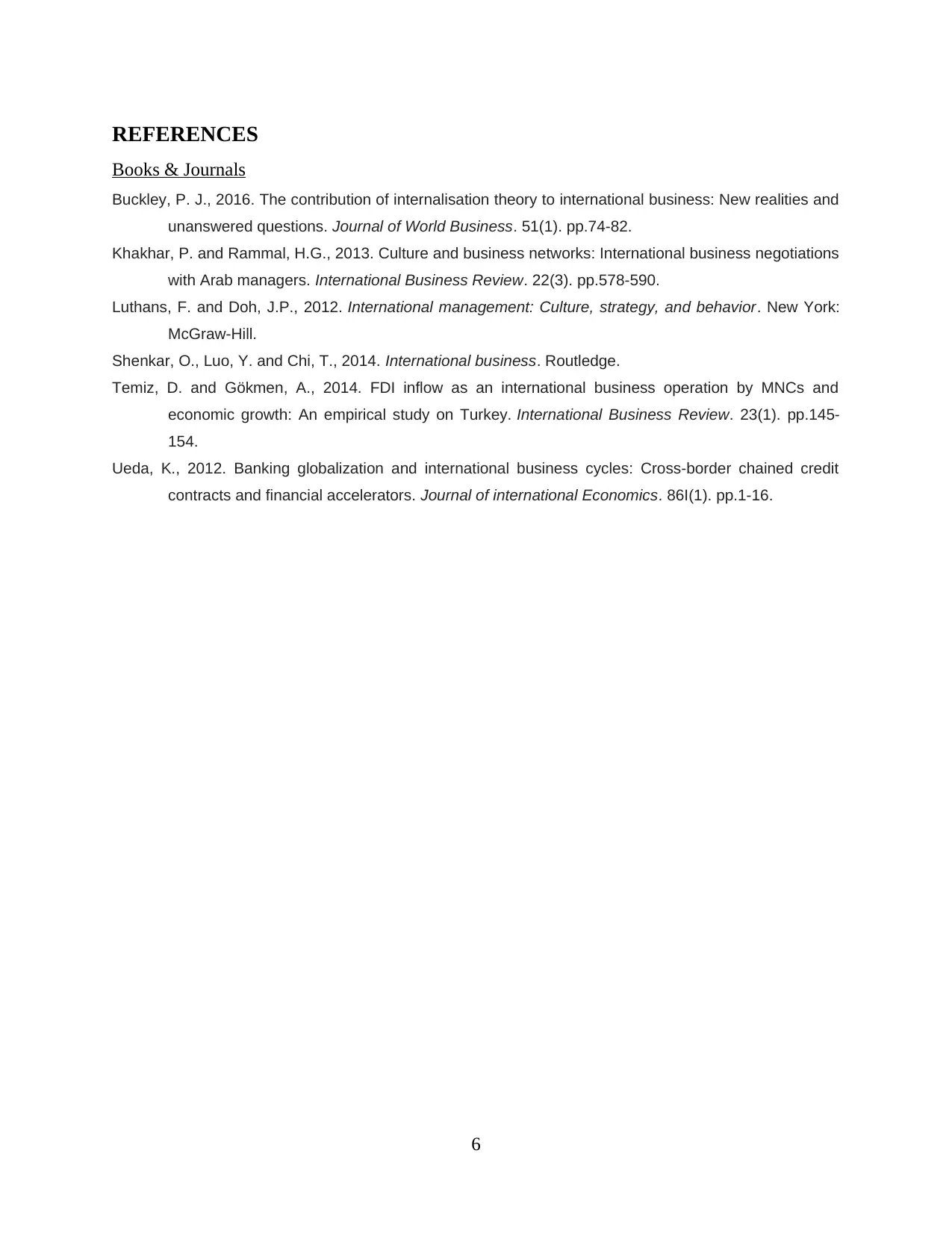
REFERENCES
Books & Journals
Buckley, P. J., 2016. The contribution of internalisation theory to international business: New realities and
unanswered questions. Journal of World Business. 51(1). pp.74-82.
Khakhar, P. and Rammal, H.G., 2013. Culture and business networks: International business negotiations
with Arab managers. International Business Review. 22(3). pp.578-590.
Luthans, F. and Doh, J.P., 2012. International management: Culture, strategy, and behavior. New York:
McGraw-Hill.
Shenkar, O., Luo, Y. and Chi, T., 2014. International business. Routledge.
Temiz, D. and Gökmen, A., 2014. FDI inflow as an international business operation by MNCs and
economic growth: An empirical study on Turkey. International Business Review. 23(1). pp.145-
154.
Ueda, K., 2012. Banking globalization and international business cycles: Cross-border chained credit
contracts and financial accelerators. Journal of international Economics. 86I(1). pp.1-16.
6
Books & Journals
Buckley, P. J., 2016. The contribution of internalisation theory to international business: New realities and
unanswered questions. Journal of World Business. 51(1). pp.74-82.
Khakhar, P. and Rammal, H.G., 2013. Culture and business networks: International business negotiations
with Arab managers. International Business Review. 22(3). pp.578-590.
Luthans, F. and Doh, J.P., 2012. International management: Culture, strategy, and behavior. New York:
McGraw-Hill.
Shenkar, O., Luo, Y. and Chi, T., 2014. International business. Routledge.
Temiz, D. and Gökmen, A., 2014. FDI inflow as an international business operation by MNCs and
economic growth: An empirical study on Turkey. International Business Review. 23(1). pp.145-
154.
Ueda, K., 2012. Banking globalization and international business cycles: Cross-border chained credit
contracts and financial accelerators. Journal of international Economics. 86I(1). pp.1-16.
6
1 out of 8
Related Documents
Your All-in-One AI-Powered Toolkit for Academic Success.
+13062052269
info@desklib.com
Available 24*7 on WhatsApp / Email
![[object Object]](/_next/static/media/star-bottom.7253800d.svg)
Unlock your academic potential
Copyright © 2020–2026 A2Z Services. All Rights Reserved. Developed and managed by ZUCOL.





